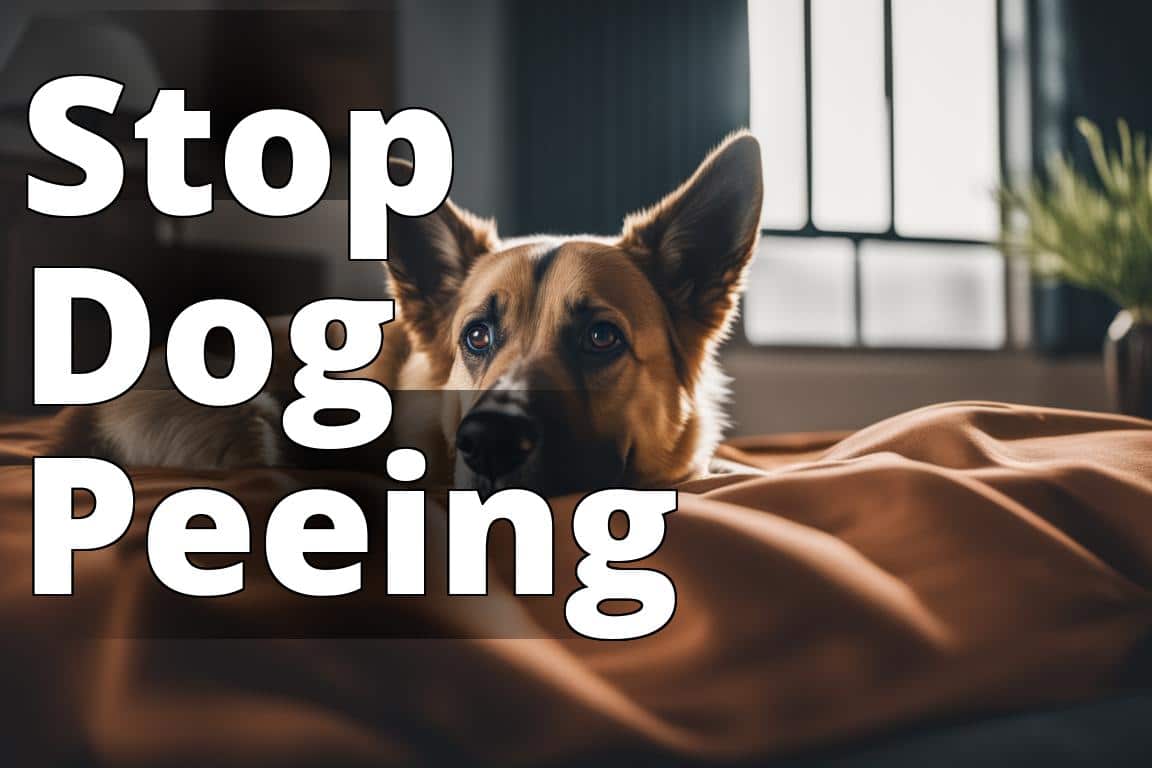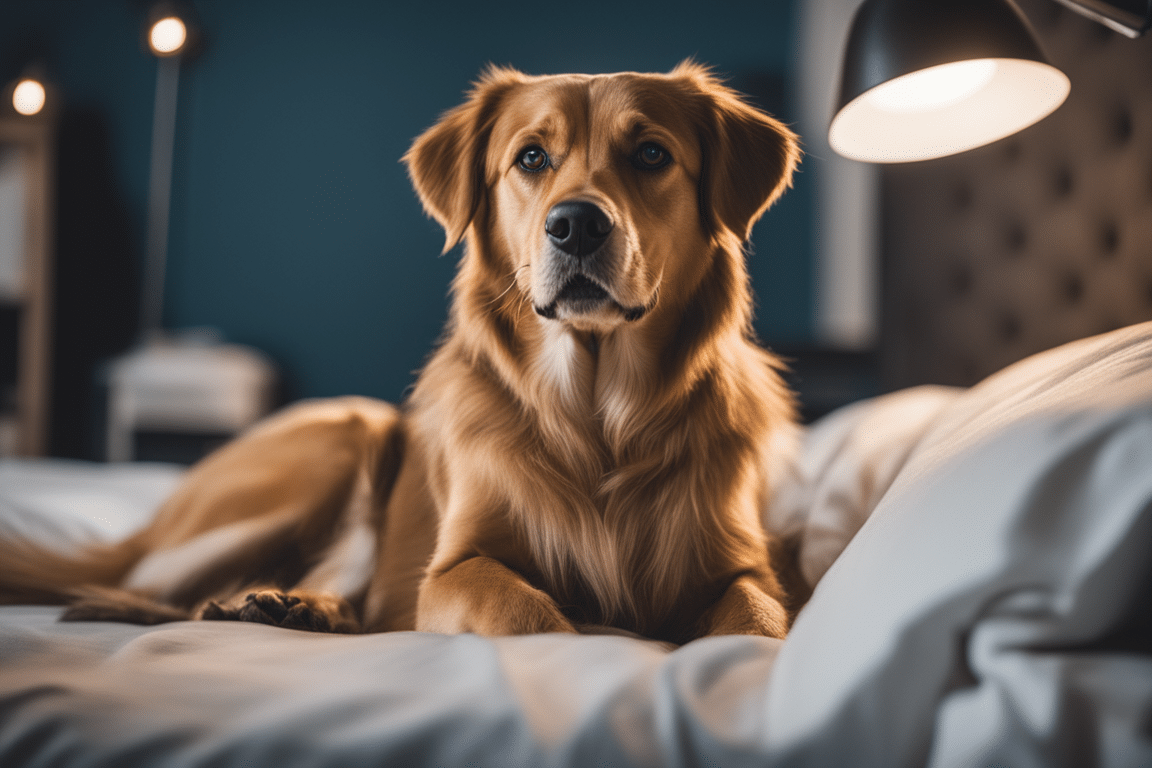

Let’s cut to the chase: if you’ve ever been greeted by a damp spot or a pungent odor on your bedspread, you know the frustration and confusion that ensues. The question of “Why does my dog pee on my bed?” transcends mere curiosity—it’s a plea for understanding and a desperate search for a solution. The truth is, that dogs pee on beds and couches for a myriad of reasons, both medical and behavioral. But before you throw your hands in the air and resign yourself to a life of plastic-covered furniture, let’s dissect this soggy issue.
Understanding Why Dogs Pee on Beds
By reading this article, you will learn:
– Medical and behavioral reasons for dogs peeing on beds
– Steps to stop a dog from peeing on the bed, including ruling out medical issues, cleaning bedding, using positive reinforcement, limiting bed access, considering a crate, and seeking professional help
Medical Reasons
In my experience, the first thing to consider when you discover your dog has turned your bed into their personal lavatory is that they might not be doing it out of spite or bad behavior. It could very well be a medical issue. From urinary tract infections to diabetes and bladder stones, there are a variety of health problems that can make holding it in challenging for our canine companions.

A visit to the vet is non-negotiable here. I learned this the hard way when my seemingly rebellious dog was actually suffering from a urinary tract infection. It wasn’t about the bed; it was about the urgency.
- Insider Tip: Always keep an eye out for other symptoms like increased thirst, changes in appetite, or lethargy. These, coupled with unauthorized pee parties, scream for a vet visit.
For a deep dive into the medical reasons behind bed-wetting, the American Kennel Club offers excellent resources on canine health that can provide further insight.
Behavioral Reasons
Once you’ve ruled out or treated any medical issues, it’s time to face the possibility that your dog’s bed-peeing antics may be behavioral. Dominance theory advocates may have you believe your pet is trying to assert itself as the pack leader. However, modern behaviorists often debunk this as an outdated and oversimplified explanation.
From anxiety and stress to improper housebreaking and seeking attention, the reasons can be complex and multifaceted. And yes, I’ve been there, too—scratching my head as my dog decided my pillow was the perfect place to relieve himself after we moved to a new house. It turned out to be anxiety-induced.
The Humane Society often has pertinent information on pet behavior that might help owners understand the why behind such actions.
Real-Life Example: Understanding the Behavioral Reasons
One dog owner, Sarah, noticed that her dog, Max, was consistently peeing on her bed whenever she left the house. After consulting with a professional dog trainer, she learned that Max was experiencing separation anxiety, causing him to seek comfort on her scent when she was away. By understanding the behavioral reasons behind Max’s actions, Sarah was able to implement positive reinforcement techniques and gradually help Max feel more secure when left alone, ultimately preventing him from peeing on the bed.
How to Stop a Dog From Peeing on the Bed
1. Rule Out Medical Issues
As we’ve covered, step one is to get a professional opinion. This should be your first course of action, as no amount of behavioral modification will fix a medical problem.
2. Clean the Bedding
After an incident, wash your bedding with an enzyme cleaner specifically designed to remove pet odors and stains. These cleaners break down the urine at a molecular level, deterring your dog from marking the same spot again.

- Insider Tip: Sun-drying your bedding can also help neutralize odors that might attract your dog back to the scene of the crime.
3. Use Positive Reinforcement
When your dog does its business where it’s supposed to, make a big deal out of it. Treats, praise, and playtime can all reinforce the behavior you want to see.
4. Limit Access to the Bed
If your dog is a repeat offender, you may need to set some boundaries. Keeping them off the bed, at least until the issue is resolved, can help break the cycle.

5. Consider a Crate
Crating isn’t about punishment; it’s about creating a safe space for your dog and protecting your bed while you’re not there to supervise.
6. Get Professional Help
Sometimes, you need to call in the big guns. Dog trainers and animal behaviorists can provide invaluable assistance in correcting your dog’s unappealing habits.
Conclusion
In conclusion, dogs pee on beds and couches for reasons that span the spectrum from medical distress to behavioral issues. As a pet owner, it’s your job to play detective, health advocate, and compassionate leader to guide your furry friend towards better habits. The journey to a dry, fresh-smelling bed can be frustrating, but with patience, understanding, and professional advice, it’s a battle you can win.
Legal Disclaimer: This content is for informational purposes only and does not substitute for professional veterinary advice, diagnosis, or treatment. Always seek the advice of your veterinarian or other qualified animal health provider with any questions you may have regarding a medical condition or behavior issues.
Q & A
Question: Why do dogs pee on beds and couches?
Answer: Dogs may pee on beds and couches due to territorial marking or anxiety.
Question: What can I do to stop my dog from peeing on furniture?
Answer: You can train your dog, provide plenty of outdoor bathroom breaks, and use deterrent sprays.
Question: How can I prevent my dog from peeing on furniture?
Answer: You can prevent this behavior by establishing a consistent bathroom routine and providing positive reinforcement for appropriate bathroom behavior.
Question: Who is more likely to pee on beds and couches, male or female dogs?
Answer: Both male and female dogs can pee on beds and couches, but it’s more common in unneutered males.
Question: What if my dog continues to pee on furniture despite training?
Answer: If your dog continues this behavior, consult a veterinarian to rule out any medical issues causing the behavior.



